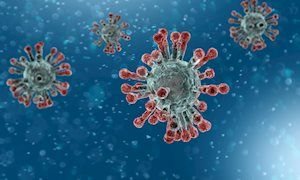
A large group of patients continues to experience symptoms long after a corona infection. Cycling tests at Radboud university medical center identified disturbed breathing regulation in a subgroup of these patients. Dedicated respiratory therapy may be beneficial for them.
A team led by pulmonologist Bram van den Borst examined 21 patients six months to a year after a corona infection. These patients had mild COVID-19, for which they were not hospitalized. Yet they developed severe long-term symptoms. For example, they suffer from severe fatigue and shortness of breath during exercise. These post-COVID symptoms severely limit their daily functioning.
Abnormal breathing during cycling tests
Lung function, blood tests and physical condition of the patients were completely normal. However, the researchers observed disturbed breathing patterns in 20 of the 21 patients during a cycling test. Van den Borst: 'During exercise, these patients are constantly searching for the best way to breathe. Some even have trouble breathing during a conversation.' The study shows that most of the patients breathe too quickly or too deeply, so-called hyperventilation. This in itself can cause fatigue and other symptoms such as shortness of breath, chest pain, dizziness and headache.
Unknown mechanism
It is not yet clear what is causing disturbed breathing in these patients. 'The regulation of breathing is complicated. Various sensors in the body transmit signals to the brain, which in turn controls the muscles that make you breathe,' says van den Borst.' It seems that those sensors are set too tightly resulting in inefficient breathing. It is also possible that disturbed muscle metabolism affects breathing regulation. Furthermore, we know that stressful events can elicit a habitual change in breathing pattern. Clearly, more research is needed to unravel underlying mechanisms.’
Better able to exercise through breathing therapy
The study provides clues for treatment of long-term symptoms after corona. The abnormal breathing and several symptoms of these patients are comparable to those observed in chronic hyperventilation syndrome. Patients with that syndrome can benefit from dedicated respiratory therapy, for example provided by a physiotherapist. Van den Borst: 'Although this was not part of the study, we are learning from patients that after such a treatment, they gained control over their breathing and better tolerated exercise. Therefore, the effects of respiratory therapy for post-COVID symptoms warrant further study.’

About the publication
This study was published in Physical Therapy & Rehabilitation: Persistent exertional dyspnea and perceived exercise intolerance after mild Covid-19: a critical role for breathing dysregulation? E. L. van Voorthuizen, H. A. C. van Helvoort, J. B. Peters, M. M. van den Heuvel, B. van den Borst. DOI: 10.1093/ptj/pzac105.
-
Want to know more about these subjects? Click on the buttons below for more news.
More information
Pauline Dekhuijzen

wetenschaps- en persvoorlichter
Related news items

Higher level of antibodies when influenza vaccine and COVID-19 booster are administered intermittently Concurrent administration of both vaccines is safe, but the quantitative and functional antibody responses against SARS-CoV-2 were marginally lower compared to booster vaccination alone
13 April 2023 read more




